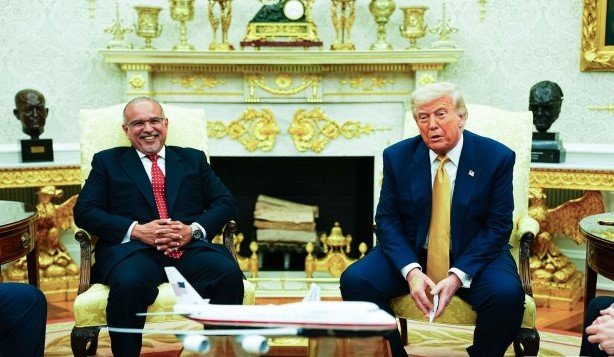With Israeli airstrikes pounding Damascus and peace prospects dimming, the former president turns to economic alliances to bolster U.S. influence in the Gulf
As Israeli warplanes roared over Syria and the Druze community pleaded for protection, Donald Trump was smiling across the Resolute Desk.
On Wednesday, the former U.S. president welcomed two influential Gulf leaders—Bahrain’s Crown Prince Salman bin Hamad Al Khalifa and Qatar’s Prime Minister Sheikh Mohammed bin Abdulrahman Al Thani—to the White House. The meetings, carefully choreographed and framed as a celebration of U.S.-Gulf ties, came as the Middle East once again teetered on the edge of escalation.
While diplomats scrambled to respond to Israeli strikes on Damascus and new unrest in southern Syria, Trump’s message was resolutely focused on dollars, deals, and what he repeatedly called “real money.”
Behind the optics was a staggering announcement: Bahrain pledged $17 billion in investments into the U.S. economy—spanning energy, logistics, fintech, and infrastructure. It was one of the largest single investment commitments by a Gulf state in recent memory, and Trump didn’t hesitate to tout it as proof of his foreign policy clout.
Diplomatic Stagecraft Amid Warplanes
The timing of the summit was no accident. Israel’s recent aerial campaign in Syria, including strikes on the outskirts of Damascus and suspected attacks on Syrian government forces near the Golan Heights, has reignited fears of a broader regional conflict. And yet, at the White House, economic diplomacy—not conflict resolution—took center stage.

For Trump, it was a moment of contrast. While Secretary of State Antony Blinken faced difficult questions on Capitol Hill about America’s role in Syria and the status of humanitarian aid in Gaza, Trump was hosting Gulf leaders over private dinners and photo ops.
“We’re not just talking about peace,” he told reporters briefly before the Bahraini delegation arrived. “We’re showing how business and stability go hand in hand.”
It wasn’t lost on observers that no Palestinian or Israeli officials were present—nor was the situation in Syria raised publicly. Instead, Trump’s focus remained on the “win-win” nature of U.S.-Gulf relations.
Bahrain’s Investment: More Than Symbolic
Crown Prince Al Khalifa, who also serves as Bahrain’s prime minister, was unambiguous about the kingdom’s financial intent.
According to officials accompanying the delegation, the investment will funnel into sectors like clean energy startups in Texas, port modernization projects in Louisiana, and joint ventures in advanced semiconductors in Arizona. The crown prince also hinted at expanding Bahrain’s sovereign fund presence in New York and Silicon Valley.
The announcement was received warmly in financial circles. Shares of U.S. firms with Gulf ties saw a modest uptick in after-hours trading, and regional analysts said the investment underscores Bahrain’s evolving strategy—from simply hosting U.S. military infrastructure to aggressively positioning itself as a capital exporter.
“The Fifth Fleet will always matter,” said Randa Slim, a Gulf specialist at the Middle East Institute. “But this deal suggests Bahrain wants to wield financial diplomacy just as effectively as security diplomacy.”
Qatar’s Role: Quiet but Crucial
Qatar’s prime minister kept a lower profile during the day’s events, skipping the Oval Office photo op but joining Trump for a private dinner in the State Dining Room. His visit came just weeks after Qatar’s delicate role in Gaza ceasefire talks and its ongoing efforts to mediate between Iran and the U.S.
While no formal investments were announced from Doha, officials hinted that new cooperation in aviation and sports infrastructure could be unveiled by fall—especially around American companies bidding for World Cup 2030 projects in Saudi Arabia, a venture Qatar reportedly supports behind the scenes.
Trump, who once accused Qatar of funding terrorism in 2017 before embracing its leader months later, now refers to the small gas-rich monarchy as a “smart and strategic friend.”
Backdrop of Bloodshed
Still, for all the handshakes and investment talk, the Middle East’s instability cast a long shadow.
Just hours before Al Khalifa’s arrival, Israel carried out fresh strikes near Damascus International Airport, with Syrian state TV airing images of rubble and burning buildings. Syrian interim president Ahmed al-Sharaa, in a rare televised speech, vowed to protect the Druze population, accusing Israel of exploiting minority tensions for “external manipulation.”
Washington, for its part, remained largely silent on the latest escalation. The Biden administration’s statement merely called for “de-escalation by all parties,” while Trump ignored the Syria strikes altogether.
Analysts say that silence was intentional.
“Trump is recalibrating the U.S. posture in the region—not through intervention but through investment,” said Maha Yahya, director of the Carnegie Middle East Center. “Whether that’s viable long-term depends on whether these economic deals can withstand regional upheaval.”
A Transactional Reset
In some ways, the day’s events offered a flashback to Trump’s earlier presidency: ornate Gulf entourages at the White House, heavy investment figures, minimal talk of human rights, and a transactional view of geopolitics.
But this time, with war clouds gathering once again in the Levant, the stakes are higher.
For Trump, the strategy is clear—solidify economic alliances with Gulf monarchies, project strength through capital, and sidestep messy regional disputes unless American interests are directly threatened.
It may not lead to peace in Syria. But it could buy the U.S. years of loyalty—and billions in capital—from a region still hungry for protection and partnership.
